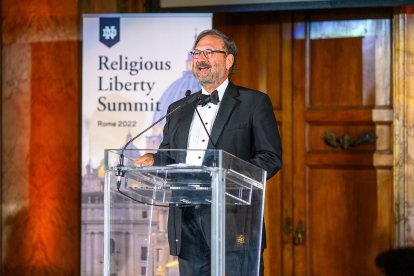Samuel Alito warns of "growing hostility toward religion"
The Supreme Court judge warns that man's achievements are fragile, religious freedom is one of them and it is in danger.

Samuel Alito, juez del Tribunal Supremo. Foto: Notre Dame Law School.
"Religious freedom is under attack because it is dangerous for those who want to have absolute power." This is one of the conclusions of the speech given by Supreme Court Justice Samuel Alito at the 2022 edition of the Religious Liberty Summit, held in Rome.
In his view, "the looming problem is not just indifference to religion. It is not ignorance of religion." The problem is that "There’s also growing hostility to religion or at least the traditional religious beliefs that are contrary to the new moral code that is ascendant in some sectors".
The legacy of the United States
"I find myself thinking about the proud civilization that was centered here two millennia ago", says the American jurist from Rome. "As I think back, I also think ahead, and I wonder what historians may say centuries from now about the contribution of the United States to world civilization". And he continues: "One thing I hope they will say is that our country, after a lot of fits and starts, and ups and downs, eventually showed the world that it is possible to have a stable and successful society in which people of diverse faiths live and work together harmoniously and productively while still retaining their own beliefs. This has been truly an historic accomplishment".
The capacity of a fundamentally free country to welcome communities with different cultural backgrounds, different religions and different ways of organizing life together is what Samuel Alito highlights in the American experience. But as Alexis de Toqueville warned, freedom is fragile, and so are the fruits of civilization. Alito says that man's achievements are not permanent. "Therefore, we can’t lightly assume that the religious liberty enjoyed today in the United States, in Europe, and in many other places will always endure. Religious liberty is fragile, and religious intolerance and persecution have been recurring features of human history", warns the judge.
Religious freedom is in danger
That there is religious persecution in the world is attested to by the reports produced every two years by the foundation Aid to the Church in Need. Alito mentions some prominent cases, such as the Yazidis in northern Iraq, the Christians in Nigeria and the Coptic Christians in Egypt, or the Uyghurs in China.
The jurist understands that "It is hard to convince people that religious liberty is worth defending if they don’t think that religion is a good thing that deserves protection". Indeed, in his view, "The challenge for those who want to protect religious liberty in the United States, Europe, and other similar places is to convince people who are not religious that religious liberty is worth special protection. That will not be easy to do".
Religious and other freedoms
But Alito recalls that religious movements have been drivers of very important social reform movements, such as the abolition of slavery in the United States. And he believes it is no coincidence that Martin Luther King was ordained a minister.
"Religious liberty and other fundamental rights tend to go together", says Alito. Moreover, "if religious liberty is protected, religious leaders and other men and women of faith will be able to speak out on social issues". Thus,"People with deep religious convictions may be less likely to succumb to dominating ideologies or trends, and more likely to act in accordance with what they see as true and right. Civil society can count on them as engines of reform", concluded the jurist.
RECOMMENDATION





















